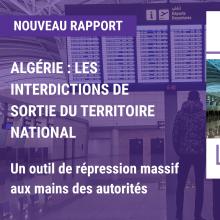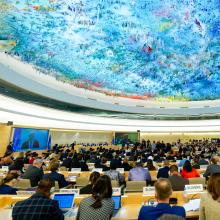Waleed Abu al-Khair is a prominent human rights lawyer and the founder of the Monitor of Human Rights in Saudi Arabia. He has provided legal representation for many victims of human rights abuses and has dedicated his life to advancing democratic reforms in the country.
Abu al-Khair was arrested on April 15, 2014, after refusing to sign an agreement stating that he would give up his human rights activism. He was then prosecuted before the Specialised Criminal Court (SCC) in Riyadh, which was set up for terror-related crimes. He was among the first activists to be tried in the SCC and under Saudi Arabia’s nascent counter-terror framework, which has been used in recent years to systematically suppress dissenting voices.
On July 6, 2014, Abu al-Khair was sentenced to a 15-year prison term, a 15-year travel ban, a fine of 200,000 Saudi riyals ($53,333 USD), and the closure of all websites linked to him. Among the charges brought against him were “inciting public opinion against the State and its people”; “inciting international organisations against Saudi Arabia with the intent of ruining its reputation”; and “setting up and supervising an unlicensed association”.
During his detention, Abu al-Khair has carried out several hunger strikes to protest his prison conditions. Since his arrest he has been subjected to ongoing ill-treatment, including solitary confinement, sleep deprivation, and denial of food and adequate medical care. In 2015 and 2018, the United Nations Working Group on Arbitrary Detention (WGAD) found that his arrest, prosecution, conviction, and sentencing lacked any legal basis. Accordingly, the Working Group called for his immediate and unconditional release, and demanded that reparations be provided.
Waleed, together with Saudi human rights defenders Abdullah al-Hamid and Mohammad Fahad al-Qahtani, received the 2018 Right Livelihood Award “for their visionary and courageous efforts, guided by universal human rights principles, to reform the totalitarian political system in Saudi Arabia”. Waleed has also been honoured with the Law Society of Upper Canada’s Human Rights Award, the Olof Palme Prize, the Ludovic Trarieux International Human Rights Award, the Pinter International Writer of Courage Award, and the American Bar Association’s International Human Rights Award.
Waleed Abu al-Khair has been unjustly detained for eight years, but he is only one of many Saudi activists unjustly detained and wrongfully imprisoned for exercising their fundamental human rights. Hundreds of individuals in Saudi Arabia are currently serving lengthy prison sentences on the basis of counter-terrorism, cybercrime, and other national or state security laws that are methodically used to silence peaceful dissenting voices in the kingdom. Furthermore, with Saudi Arabia stepping up the pace of executions and the repression of activists since the end of its G20 presidency, it is crucial to keep the country’s human rights record under close scrutiny.
We, the undersigned, call on the Saudi authorities to:
- immediately and unconditionally release Waleed Abu al-Khair, as well as all other human rights defenders detained in Saudi Arabia solely for exercising their rights to freedom of expression, association, and peaceful assembly.
- promptly reform the anti-cybercrime and counter-terrorism laws, including by formulating a clear and detailed definition of an act of terrorism, to bring these laws in line with Saudi Arabia’s international human rights obligations; and
- ensure that all human rights defenders in the country are able to carry out their legitimate and peaceful work, in all circumstances and without fear of intimidation and reprisals.







